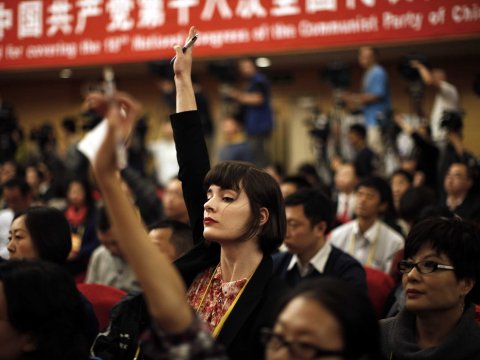
|
All eyes are on the upcoming 3rd Plenum of the 18th Communist Party of China (CPC). Slated to take place between Nov. 9 to 12 in Beijing this is often a platform in which Chinese officials announce crucial reforms. We reached out to Bill Bishop, author of the must-read Sinocism China Newsletter, to understand why these meetings are so important and what reforms we can expect this year. Business Insider: What is the 3rd Plenum? Bill Bishop: A Plenum is a meeting of the Communist Party’s Central Committee. This Central Committee has 205 full and 171 alternate members, chosen at the First Plenum of the 18th Party Congress in November 2012. Each Party Congress lasts for 5 years, and with the exception of the first year there is usually one Plenum held per year. The Politburo, comprised of 25 members, meets more regularly, and the Standing Committee, made up of 7 members, meets even more frequently. Xi Jinping is the General Secretary of the Party and also holds the top posts in the State (President) and Military (Chairman of the Central Military Commission) Third Plenums are seen as important because the First Plenum introduces the new leadership, the Second Plenum tends to be personnel- and Party construction-focused, while the third one is usually seen as the first plenary session at which the new leadership has basically consolidated power and can introduce a broader economic and political blueprint. BI: Why is it significant? BB: Not all Third Plenums are that significant, and plenty of reforms have happened outside of a Third Plenum, But, the Third Plenum of the 11th Party Congress in December 1978 launched “reform and opening” and put China on its current path. The Third Plenum of the 14th Party Congress, held in November 1993, formally endorsed the concept of “Socialist market Economy”, which provided the theoretical foundation and political cover for a more aggressive set of economic reforms pushed by then-Premier Zhu Rongji BI: What reforms should we expect at the 3rd Plenary Session of the 18th CPC? BB: The top leadership has recently repeatedly said that the Third Plenum will introduce comprehensive and unprecedented reforms. The hope is that the Plenum will introduce land ownership and transfer reforms, broader financial reforms, changes to the household registration system that give rural residents greater rights and social protections, changes to the center-local fiscal relationships, more trade liberalization to increase openness, policies designed to try to spur innovation, factor price reform that may weaken State-Owned Enterprises (SOE), reduction of administrative interference in the economy, and a 5 year plan to combat corruption. BI: What reforms do you think will be sidelined? BB: There may be some SOE reforms but we will not see talk of privatization. More likely there will be reforms that will weaken many of those SOEs, such as factor price reform. There will be political reform but not in the Western, liberal sense. The goal will be to make the party more efficient, responsible and accountable, all to ensure continued single Party rule. Some people argue that China’s can not truly transform its economy without broader, liberal political reforms that unleash a “marketplace of ideas”, creativity and innovation. The leadership does not seem to agree with that argument. Effectively combating corruption is key to most of these reforms. if the Party can not get corruption under control—not eradicate it, as that is unrealistic—then much of this will be just talk. BI: What does this mean for the Chinese economy? BB: It is unclear. Many of these changes will take years to implement, and some may be thwarted or distorted as they flow from the center down through the bureaucracies. But expect the overarching goal to be the transformation of the economic growth model and the de-emphasis of GDP. BI: Why should investors care? BB: If the leadership gets it right then China should be able to work through many of the current economic problems, albeit very painfully. If they do not, the country may be headed to severe distress in the next few years. As for individual stocks, there are lots of local analysts putting out recommendations on stocks that could benefit and some have run up significantly ahead of the Plenum. At least in the short-term you may see smart investors “buying on the rumor and selling on the Plenum”, as there are so many expectations built into this upcoming meeting that it is hard to see how there will not be disappointment in the near-term. And expect many of the pundits and economists to express “disappointment” with whatever is in the report, so there may be a shift back toward more negative sentiment about China in overseas discourse. But smart investors and entrepreneurs and executives know that there will be plenty of money-making opportunities for those who can understand what the report is really saying. BI: Anything else you think our readers should know? BB: Some of the most important reforms in China are not mandated from Beijing, either in Third Plenums or other meetings, but happen at the local levels and then are adopted in other areas around the country. So while the Plenum Report will be important, it will be far from the end of what reforms may occur in the country over the next few years. |
查看译文 Sinocism中国电邮通讯是利明璋为帮助外国读者更好了解中国而发起的。我们向他了解这些会议的重要性,以及今年可以期待哪些改革。
利明璋:全会是中共中央召开的会议。2012年11月十八届一中全会上选举出由205名中央委员,171名候补委员组成的十八届中央委员会。党的中央委员会每届任期五年,除第一年外每年通常都会召开全会。25名中央政治局委员定期会面,而7名常委则更经常会面。习近平现任中国共产党中央委员会总书记,中华人民共和国主席,中共中央军事委员会主席。
利明璋:并非所有的三中全会都那么重要,很多改革也不是三中全会上提出的。但是,正是由于1978年12月召开的十一届三中全会上提出的“改革开放政策”,中国的发展才走上正轨,呈现出今天这一局面。 1993年11月召开的十四届三中全会正式支持“社会市场经济”这一概念,它为朱镕基总理贯彻更积极的经济改革政策提供了理论基础和政治保护。
利明璋:高层领导近期反复强调三中全会将进行全面深化的改革。人们希望三中全会提出土地产权和流转改革、实现更广泛的金融改革、改革户口登记制度以使农村居民享受更多权利和社会保护、改变中央地方财政关系、推进贸易自由化以增强开放性、出台激发创新的政策、改革可能削弱国有企业的生产要素价格、减少经济中的行政干预、制订五年规划打击腐败。
利明璋:有些国有企业的改革可能不会提到私有化问题。更有可能会提到削弱国有企业的一些改革,如生产要素价格的改革。也会提到政治改革,但不会是西方自由意义层面上的改革。三中全会的目标是使共产党更有效率,更加负责,进而确保一党专政的继续执行。 一些人认为中国若不采取更为广泛、更为自由、释放思想、进行创新的政治改革,就不能真正实现经济改革。领导集体似乎并不同意这一观点。 实现大部分改革的核心是高效的反腐行动。如果党控制不了腐败问题或无法根除腐败行为(完全消灭毕竟不大现实),那大部分改革都只是空话。
利明璋:目前还不清楚。大部分改革需要实施多年,有些改革从中央下到各政府机构时可能会受到阻挠或歪曲。但是可以预期首要的目标是转变经济增长方式和弱化GDP的重要性。
利明璋:如果领导层正确实施改革,虽然会很艰难,但中国应该能解决当前面临的经济问题。但如果经济问题得不到解决,中国在接下来的几年中可能会遭遇严重的困境。 就个人股而言,很多地方分析人士开始推荐可能从全会受益的股票,而有些股票在全会之前价格已经大幅上涨。至少短期内你会发现精明的投资者“一有谣言就买,一开全会就卖”,因为很多人都把期望寄托在这个即将到来的会议,但近期看来是会令人失望。很多专家和经济学家预计会对报告的内容表达他们的“失望”,因此海外对中国的报道可能会转回更为负面的情绪。
利明璋:中国一些重要的改革并不是由中央在三中全会或其他会议上批准执行的,而是先在地方层面执行,随后被国内其他地区采纳。所以,尽管三中全会的报告很重要,但它远非中国接下来几年可能实施的最终改革。 (译者 lyyzk09 编辑 丹妮) |